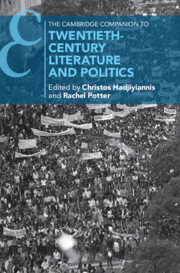Book contents
- The Cambridge Companion to Twentieth-Century Literature and Politics
- The Cambridge Companion to Twentieth-Century Literature and Politics
- Copyright page
- Contents
- Figures
- Notes on the Contributors
- Acknowledgements
- Chronology
- Introduction Literature and Politics
- Part I 1900–1945: Ideas and Governance
- Part II 1945–1989: New Nations and New Frontiers
- Part III 1989–2000: Rights and Activisms
- Chapter 14 Women’s Rights
- Chapter 15 Sexual Rights
- Chapter 16 Indigenous Rights
- Chapter 17 Environmental Rights
- Chapter 18 Neoliberalism
- Further Reading
- Index
- Cambridge Companions To …
Chapter 16 - Indigenous Rights
from Part III - 1989–2000: Rights and Activisms
Published online by Cambridge University Press: 01 December 2022
- The Cambridge Companion to Twentieth-Century Literature and Politics
- The Cambridge Companion to Twentieth-Century Literature and Politics
- Copyright page
- Contents
- Figures
- Notes on the Contributors
- Acknowledgements
- Chronology
- Introduction Literature and Politics
- Part I 1900–1945: Ideas and Governance
- Part II 1945–1989: New Nations and New Frontiers
- Part III 1989–2000: Rights and Activisms
- Chapter 14 Women’s Rights
- Chapter 15 Sexual Rights
- Chapter 16 Indigenous Rights
- Chapter 17 Environmental Rights
- Chapter 18 Neoliberalism
- Further Reading
- Index
- Cambridge Companions To …
Summary
Since the 1970s, Indigenous activists have fought for the recognition of Indigenous rights both nationally and internationally, a fight that arguably culminated in the passage of the United Nations Declaration on the Rights of Indigenous People in 2007. Despite this victory, however, state actors continue to violate Indigenous rights, a violation that this chapter argues stems from the disaggregation of Indigenous rights from Indigenous law. In other words, Indigenous peoples residing within the borders of settler-colonial nation states, including the United States and Canada, are recognised as rights-bearing individuals and collectives, but these states still refuse to recognise the existence of independent, extra-colonial Indigenous legal systems. This phenomenon is a particular concern of contemporary Indigenous writers, including Michi Saagig Anishinaabe writer Leanne Betasamosake Simpson, whose poem “jiibay or aandizooke” demonstrates how settler legal systems that operate without regard for Indigenous law suppress the latter. Simpson’s work demonstrates why Indigenous rights and law must be recognised together.
Keywords
- Type
- Chapter
- Information
- Publisher: Cambridge University PressPrint publication year: 2022

